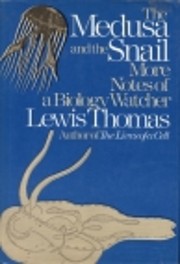

Klik op een omslag om naar Google Boeken te gaan.
|
Bezig met laden... The Medusa and the Snail: More Notes of a Biology Watcher (1979)door Lewis Thomas
 Geen Bezig met laden...
Meld je aan bij LibraryThing om erachter te komen of je dit boek goed zult vinden. Op dit moment geen Discussie gesprekken over dit boek.   ) )An enlightening and amusing collection of essays - at times prescient, and at others mired in hubris. An informative and entertaining read nonetheless. (A caveat: a non-medical-science/field reader may find some of the essays a bit too beholden to medical jargon.) Highly recommended for those in medicine and medical science in need of a historical voice to refocus/reassess one's efforts and aims; recommended for the general reader seeking a medical perspective on life and its issues. Not what I expected, but I was pleasantly surprised. This book was given to me by a LibraryThing member. I was not familiar with Lewis Thomas. The book was published in 1974. The first essay or two made me afraid it would be a treatise to the absence of God in the world, due to the findings of science, but I liked the author's positive tone and his marvel of the world around him. Then I read the essays on medical research and practice and they were beautiful and inspiring. His essays ripple with the light touch of humor, the depths of thinking and excitement for the future. Some of them are predictive considering they were written fifty years ago. Others are engaging in the plight of humanity. One of his hobbies is language and the origins thereof, and so several essays discuss word origins and are quite playful. A rather scattered collection of essays, with no real connecting thread except "Lewis Thomas' thoughts". Not even biology, there's a few about astronomy and cosmology, some about basic (as opposed to applied) science, some about medicine (which is biology, sort of). One was weird and wonderful - it reminded me very much of (a long-time favorite) Italo Calvino's Cosmicomics. Same sort of science-based surreal fantasy - in this case, spinning the world around his pencil-point, and apologizing to the astronomers and the like who had to deal with this temporarily altered structure of the universe. Some of the later essays were making good points, about how what medicine really needs at this point (that point - written in the 80s) is not medical studies but basic science about the structure of bodies/cells/viruses/DNA/the brain/etc - and the surprises there will lead to real cures later on. However, I'd gotten so annoyed with him at that point that I was only reluctantly agreeing. In the essays earlier in the book, he repeatedly tossed off an assertion ("I see no reason why there should not be genes for usefulness"), then used that assertion as support for his argument in the next essay ("We have genes for usefulness, and that is as close as I can imagine as a goal for the world" (Gaia - world as organism - which is a pretty weird argument by itself without trying to find a purpose for it)). He also shows his medical background pretty heavily - when he mentions any medical matter, he gets very technical. Not pneumonia, not the pneumonia bacteria, but "pneumonicocci". I understood, more or less, but the precision there stood out against the vagueness of most of his statements, especially the linguistic ones. I need to remember that despite the fascinating subjects he says his books are about, I really don't like Lewis Thomas as a writer. Oh, and the story of the medusa (jellyfish) and the snail is, again, tossed off in a couple paragraphs. It's an interesting story of co-parasitism and symbiosis - but there's no _point_ to the story and nothing really known about it (do some of the jellyfish not get snails, and if so what happens to them? Do some of the snails not get in the jellyfish, and ditto? How does the symbiosis help either creature - what's the advantage? If you don't care about these questions, why write about the combination at all?). Bah. I think I'll get a Stephen Jay Gould for a table book for a while - I know his essays won't leave me hanging like this. geen besprekingen | voeg een bespreking toe
Is opgenomen inPrijzenOnderscheidingenErelijsten
The medusa is a tiny jellyfish that lives on the ventral surface of a sea slug found in the Bay of Naples. Readers will find themselves caught up in the fate of the medusa and the snail as a metaphor for eternal issues of life and death as Lewis Thomas further extends the exploration of man and his world begun in The Lives of a Cell. Among the treasures in this magnificent book are essays on the human genius for making mistakes, on disease and natural death, on cloning, on warts, and on Montaigne, as well as an assessment of medical science and health care. In these essays and others, Thomas once again conveys his observations of the scientific world in prose marked by wonder and wit. Geen bibliotheekbeschrijvingen gevonden. |
Actuele discussiesGeenPopulaire omslagen
 Google Books — Bezig met laden... Google Books — Bezig met laden...GenresDewey Decimale Classificatie (DDC)574Natural sciences and mathematics Life Sciences, Biology BiologyLC-classificatieWaarderingGemiddelde: (4) (4)
Ben jij dit?Word een LibraryThing Auteur. |
||||||||||||||||||||||||||||||||||||||||||||||||||||||||||||||||||||||||||||||||||||||||||||||||||||||||||||||||||||||||||